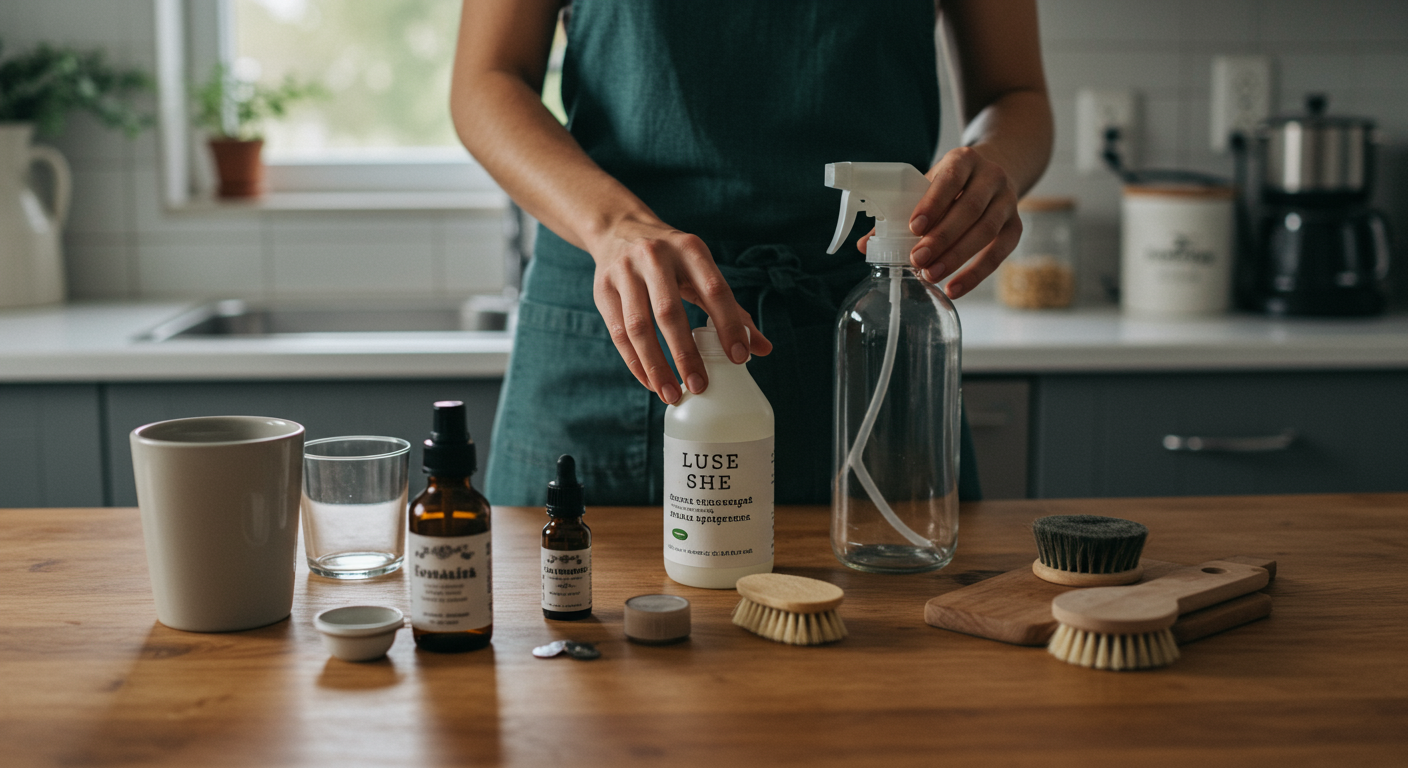Creating a clean and healthy home doesn't have to involve harsh chemicals and a hefty price tag. Embracing eco-friendly cleaning is a fantastic step toward a sustainable lifestyle, and the best part? It's easier than you think! This guide provides simple, effective DIY recipes for cleaning products that are good for your home and the planet.

Why Choose DIY Eco-Friendly Cleaning Products?
Switching to DIY cleaning products offers numerous benefits. You'll reduce your exposure to harmful chemicals found in many commercial cleaners, which can trigger allergies and respiratory issues. By making your own cleaners, you minimize plastic waste from disposable bottles and packaging. Plus, you'll often save money in the long run, as DIY solutions use affordable, readily available ingredients.
Essential Steps to Get Started
Gather Your Supplies: You'll need a few basic ingredients and tools to get started. Consider these essentials:
- Spray Bottles: Choose reusable spray bottles, preferably glass or BPA-free plastic. This is a great way to reduce waste.
- Microfiber Cloths: These are excellent for cleaning various surfaces without leaving streaks and they are reusable.
- Essential Oils: Essential oils add pleasant scents and cleaning power. Be sure to choose high-quality, pure essential oils.
- Baking Soda: A natural abrasive and deodorizer, perfect for scrubbing and freshening.
- White Vinegar: A versatile cleaner and disinfectant.
- Castile Soap: A plant-based soap that's gentle yet effective for cleaning.
Start Simple: Begin with a few easy recipes to get comfortable with the process.
Label and Store: Always label your homemade cleaners clearly, including the ingredients and the date you made them. Store them in a cool, dry place, away from children and pets.
Common Beginner Questions Answered
- Are DIY cleaners as effective as commercial products? Yes! DIY cleaners can be just as effective, if not more so, than commercial products, especially for everyday cleaning tasks. The key is to use the right ingredients and follow the recipes correctly.
- Are DIY cleaners safe for all surfaces? Always test your cleaners in an inconspicuous area first, especially on delicate surfaces like natural stone or wood. Avoid using acidic cleaners (like vinegar) on marble or granite, as they can damage the surface.
- How long do DIY cleaners last? Most DIY cleaners have a shelf life of several months to a year, depending on the ingredients. It's best to make small batches and use them within a reasonable timeframe.
Tips for Success
- Start with a Basic All-Purpose Cleaner: Mix equal parts white vinegar and water in a spray bottle. Add a few drops of your favorite essential oil (like lemon or lavender) for fragrance. This cleaner is great for countertops, tables, and other surfaces.
- Make a Glass Cleaner: Mix equal parts white vinegar and water in a spray bottle. Spray on glass surfaces and wipe clean with a microfiber cloth. This is a streak-free solution.
- Create a Laundry Detergent: Mix 1 cup of grated castile soap, 1/2 cup of baking soda, and 1/2 cup of washing soda. Use 1-2 tablespoons per load.
- Customize Your Scents: Experiment with different essential oil combinations to create your own signature cleaning scents.
Understanding Your Impact
By making your own cleaning products, you're taking control of your environmental impact. You're reducing your carbon footprint by avoiding the transportation of commercial cleaning products and their packaging. You're also helping to prevent harmful chemicals from entering our waterways and ecosystems.
Finding Eco-Friendly Alternatives
When sourcing ingredients, look for eco-friendly options. Consider purchasing essential oils from reputable brands that practice sustainable sourcing. Choose ingredients that come in minimal packaging, such as buying vinegar in bulk and storing it in a reusable container.
Quick & Easy Sustainable Swaps
- Reusable Spray Bottles: Instead of buying new bottles every time, use reusable spray bottles.
- Microfiber Cloths: Ditch paper towels in favor of reusable microfiber cloths.
- Bulk Buying: Purchase ingredients like vinegar, baking soda, and castile soap in bulk to reduce packaging waste.
- Essential Oils: Choose high-quality essential oils for scent and cleaning properties.
Next Steps in Your Green Journey
Once you're comfortable with these basic recipes, explore more advanced DIY cleaning solutions. Consider making your own dish soap, bathroom cleaner, and even furniture polish. The possibilities are endless! Continue learning about sustainable living and making small changes that have a big impact.